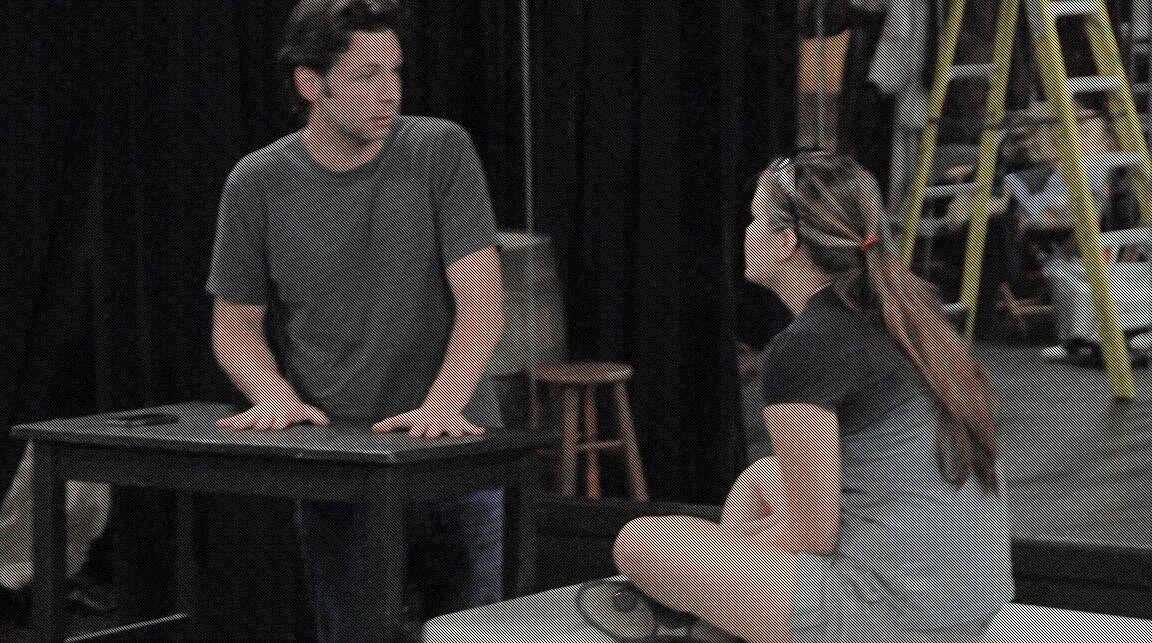Thanks to Katie McDowell for this awesome video.
Buckner is an awesome film teacher. Actually, I loved the whole camp.
Diego Rodriguez (Filmmaking Major 2011)
Age 15 from Monterrey, Nuevo León, Mexico
Philosophy
Filmmaking at TAP Camp is a very hands-on experience. Students spend most of their time with Buckner Cooke, who guides them through the process, techniques and enjoyment of creating films from scratch. He teaches them the techniques necessary to create solid material and gives them the freedom to be creative and innovative. Campers also take workshops in screenwriting, film directing, casting and more. Additionally, they are given the opportunity to take non-major classes in voice, dance, acting and technical theatre.
Curriculum
Students examine current trends in the industry and explore their personal creative process as they learn film production from concept to product. In a very hands-on approach, turn your concept into a screenplay and your screenplay into a film. Filmmakers are given the tools and support to create films of their choosing based on the theme for the final showcase. Each student proposes a film concept for approval on the second day of camp. The first week is spent writing the screenplays and engaging in film training classes. Week two, filmmaking majors are assigned a job on each film and each director is given a cast (campers from other majors). Each film major plays a different role on the multiple films created, with the opportunities to write, direct, assistant direct, produce, mix, boom, gaffe, and edit. The third week is for editing and all films are screened on the final day of camp.
Course Descriptions
Production Equipment
A comprehensive introduction to basic film production techniques and equipment. Proper procedures are explained for the use of cameras, lenses, lights, microphones, mixers, and editing equipment.
Directing
Introduction to the crafts of acting and directing for the film medium; with emphasis on the visualization of the screen play, the junction of the actor in interpreting the script, and the role of the director in handling actors in the production of a film.
Screenwriting
Turn your concept into a screenplay by exploring plot, character, scenes and dialogue. Emphasis is on character development as well as shaping and refining the story. Learn the basics of screenwriting as you develop your own work.
Cinematic Techniques
Addresses the basic problems of designing and directing scenes for motion pictures. Some of the problems discussed are the relationship of film to reality, continuity, shot selection, coverage, cut selection and visualization techniques.
Editing
We offer hands on experience in the creative and mechanical aspects of editing for both sound and picture. Students will have complete access to the tools necessary to professionally edit their films on Apple G5 computers and the Final Cut Pro editing software. This is the same software used on award winning films such as True Grit, No Country For Old Men, (500) Days Of Summer and this year’s Academy Award winner for best editing: The Social Network.
The Motion Picture Grip
In this hands-on course, students will learn basic grip skills and operate equipment and tools used on location and the motion picture stage.
Lighting
Examines the tools and techniques of lighting. Classroom time includes lecture but is primarily devoted to hands-on lighting and shooting exercises.
Sound
This is an historical, technical and aesthetic overview that covers microphones, location sound recording problems, microphone types and placement, transfer, ADR, Foley, sound effects, sound editing and mixing.
The History of Film
History of the development of motion pictures, with examples, from their beginnings to the present day. Emphasis is placed on the American feature film. In addition to lectures on film history, fiction films from the silent era to the modern day will be screened and discussed.
Specials
Guest artists may be brought in for special topics such as Stage Combat, Resume Creation, Make-Up, Film Acting, Film Producing, Film Casting, etc.
Practicum
Once the films have been written, the Filmmaking Majors spend their time on location filming each movie, and then they go into the editing room to create the finished products.
SHOWCASE
Not only do film majors get the opportunity to perform live on stage with their fellow musical theater and acting campers, they also have their own presentation of films as the final event before everyone goes home. All of the original films produced throughout the camp will be premiered in the main theater in front of campers, staff, and parents.
Don't forget to check out...
Bindlestiffs wins the Audience Award for Best Feature Film at Slamdance Festival 2012. We are so proud of former TAP Campers Andrew Edison (Co-creator/director) and Katie McDowell (Director of Cinematography) for their awesome success!




